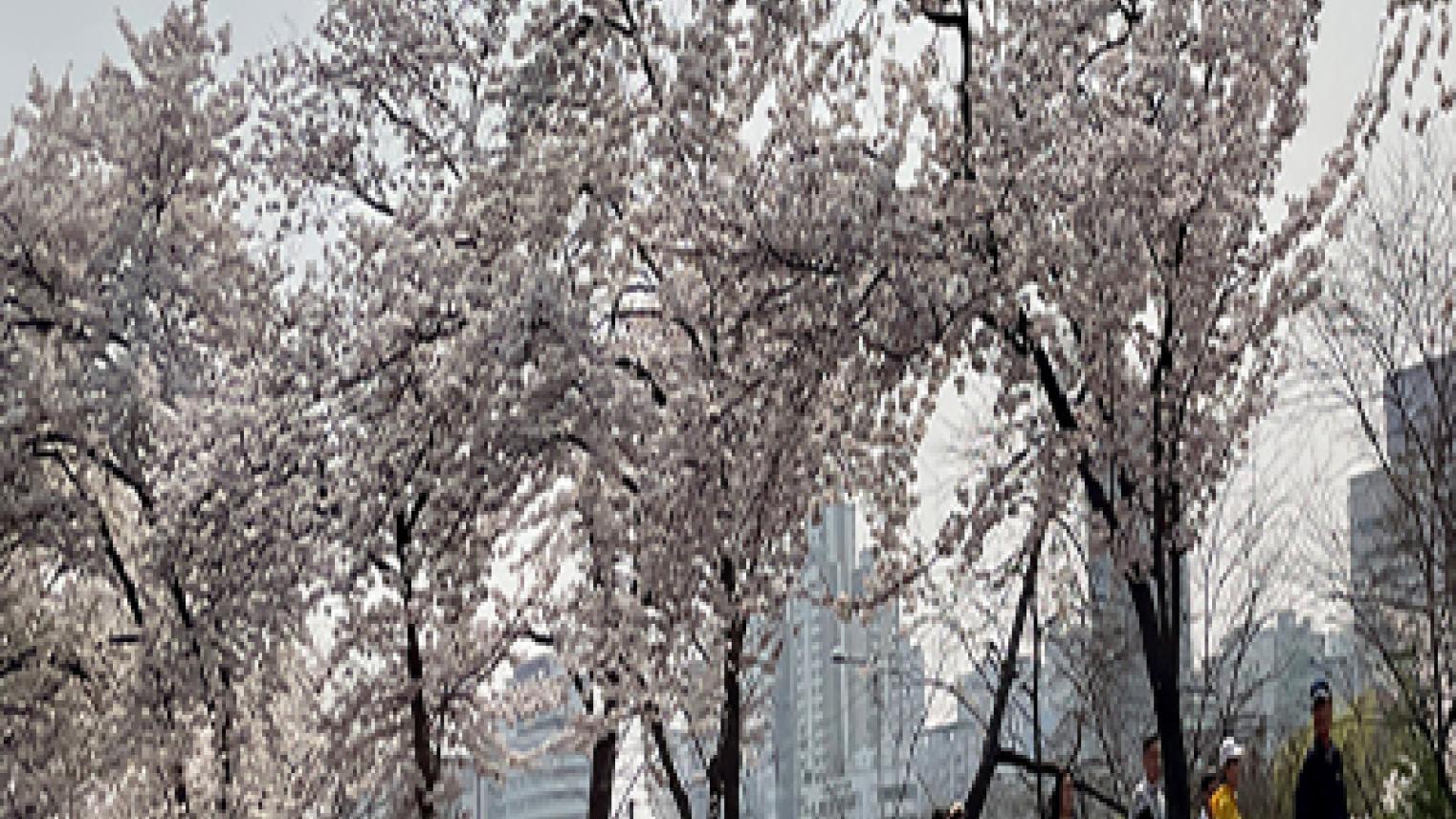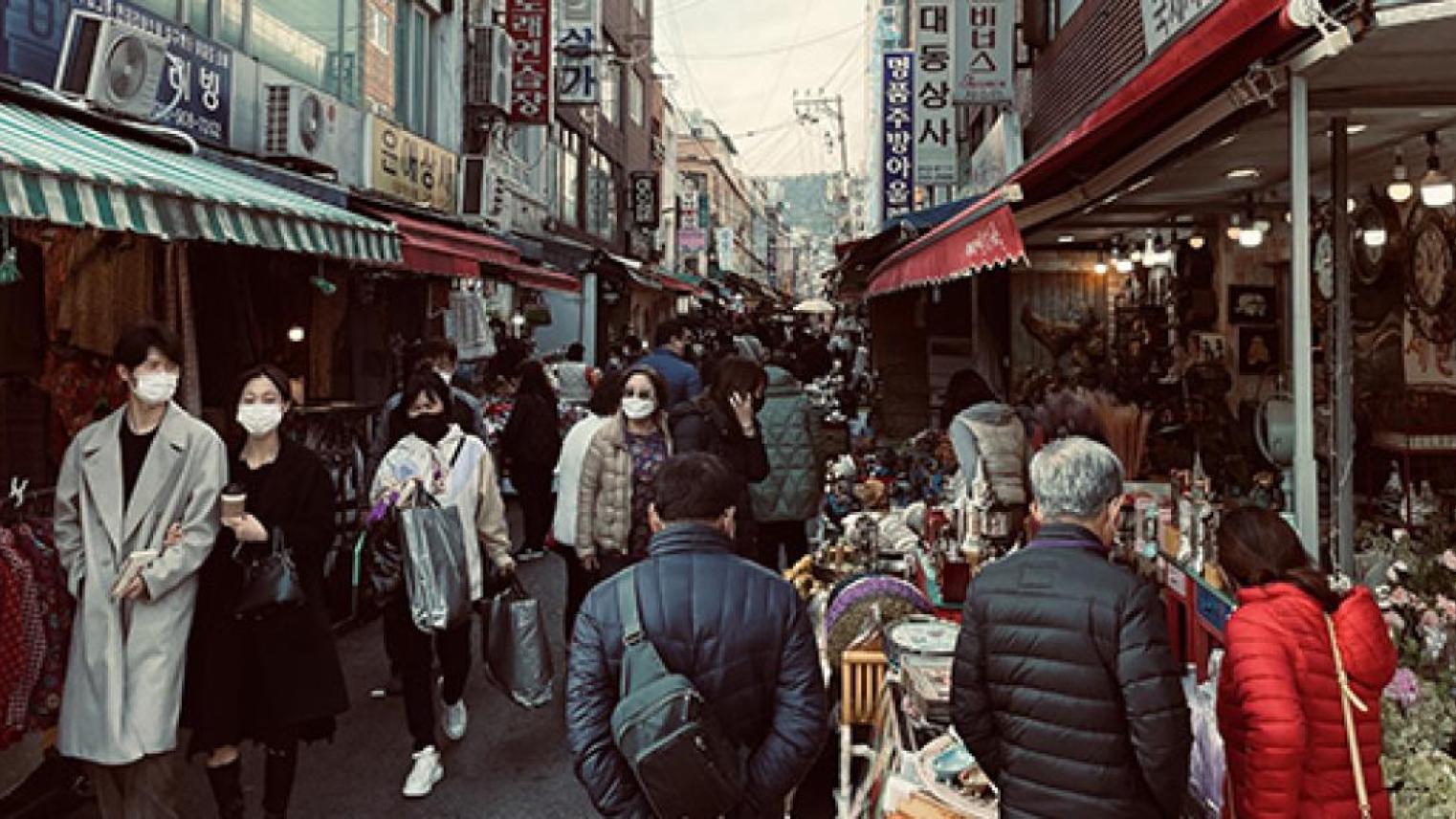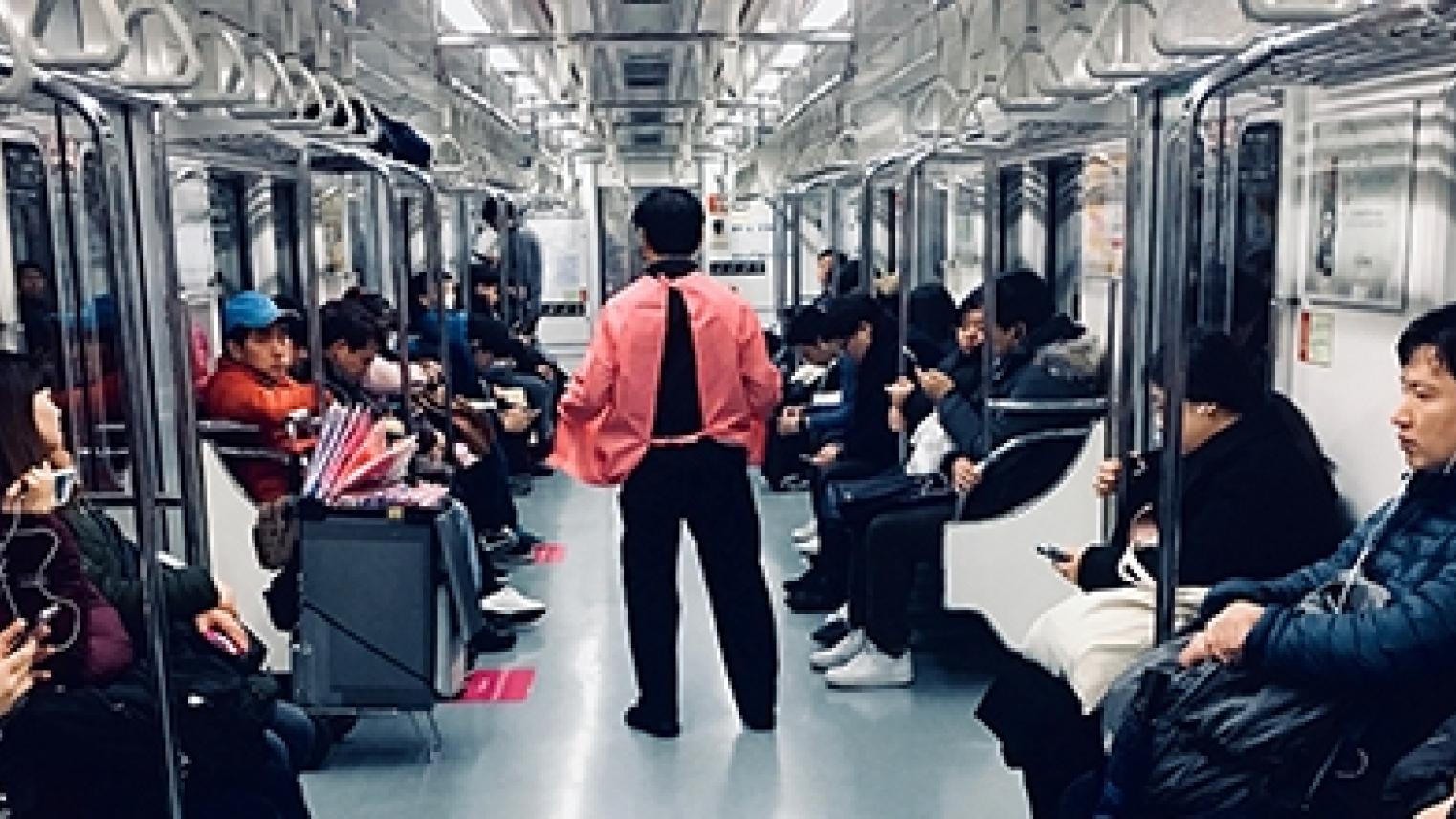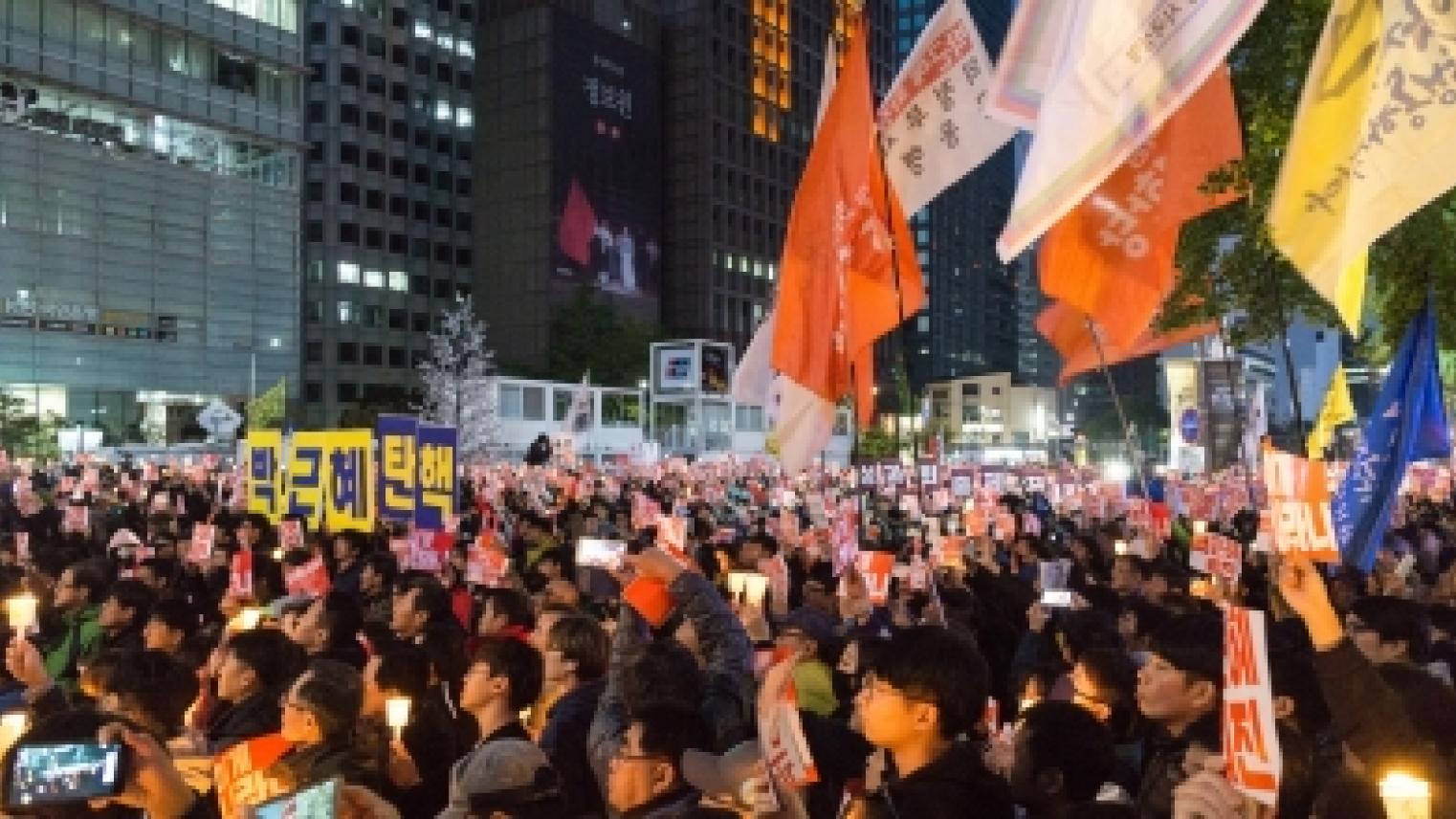The ANU Korea Update is the University’s flagship annual conference on Korea.

2023 Korea Update - “Remaking South Korea”
"2023 Korea Update - "Remaking South Korea"
- Dates: Fri 22 September 2023
- Mode: In-person in the Lotus Theatre, Australian Centre on China in the World, ANU.
PANEL 1: Keynote
- 'Popular Sovereignty and the Rule of Law in South Korea': Chaihark Hahm, Yonsei University School of Law
- Response and Comment: Elizabeth Lee, Member of the ACT Legislative Assembly
PANEL 2: Foreign Relations, Security, and Economy
- 'North Korea’s Evolving Political Economy: Implications for South Korea and the World': Peter Ward, Kookmin University
- 'Growing into Responsibility: South Korea's Emerging Role as a Regional Player in the Indo-Pacific': Choi Yoon-jung, Sejong Institute
- 'South Korea’s Place in the Northern Flank of the US-led Security Network': Jae Jeok Park, Yonsei University
PANEL 3: Multi-Cultural South Korea
- 'Understanding South Korea-Japan Relations through Webtoon Culture’: Jin-kyung Park, Hankuk University of Foreign Studies
- 'Decentering Multiculturalism: Marriage Migrant Women’s Stories between Vietnam and South Korea': Hayeon Lee, Australian National University
PANEL 4: Popular Culture in South Korean Society
- 'Projecting the Future of South Korean Cinema': Darcy Paquet, Busan Academy of Film Studies
- 'Urban Apocalypse and Korean Youth: Unveiling Anxieties in Media': Hee-seung Irene Lee, University of Auckland
Read more
Program Details
PANEL 1: Keynote, 9:15 - 10:30am
Moderator: Prof. Kyung Moon Hwang
- 'Popular Sovereignty and the Rule of Law in South Korea' (9:15-10:00am): Chaihark Hahm , Yonsei University School of Law
- Response and Comment (10:00-10:10am): Elizabeth Lee, Member of the ACT Legislative Assembly
- Discussion (10:10-10:30am)
10:30-10:45am: Morning Tea
PANEL 2: Foreign Relations, Security, and Economy, 10:45am-12:45pm
Moderator: Prof. Ruth Barraclough
- ‘North Korea’s Evolving Political Economy: Implications for South Korea and the World’ (10:45-11:25am): Peter Ward, Kookmin University
- 'Growing into Responsibility: South Korea's Emerging Role as a Regional Player in the Indo-Pacific' (11:25am-12:05pm): Choi Yoon-jung, Sejong Institute
- 'South Korea’s Place in the Northern Flank of the US-led Security Network'(12:05pm-12:45pm): Jae Jeok Park, Yonsei University
12:45-1:45pm Lunch
PANEL 3: Multi-Cultural South Korea, 1:45 – 3:15pm
Moderator: Dr. Eunseon Kim
- ‘Understanding South Korea-Japan Relations through Webtoon Culture’ (1:45-2:30pm): Jin-kyung Park, Hanguk University of Foreign Studies
- 'Decentering Multiculturalism: Marriage Migrant Women’s Stories between Vietnam and South Korea': Hayeon Lee, Australian National University (2:30-3:15pm)
3:15-3:30pm: Afternoon Tea
PANEL 4: Popular Culture in South Korean Society, 3:30 – 5:00pm
Moderator: Prof. Roald Maliangkay
- ‘Projecting the Future of South Korean Cinema’ (3:30-4:15pm): Darcy Paquet, Busan Academy of Film Studies
- ‘Urban Apocalypse and Korean Youth: Unveiling Anxieties in Media’ (4:15-4:45pm): Hee-seung Irene Lee, University of Auckland
Closing Remarks
Speakers
Keynote - Popular Sovereignty and the Rule of Law in South Korea' (9:15-10:00am): Hahm Chaihark, Yonsei University School of Law
Abstract: "South Korea has achieved the twin goals of economic prosperity and constitutional democracy, a rare feat among nations that (re)gained independence after the Second World War. Its current constitution, adopted in 1987, was the result of the people's struggle for democracy. As such, enforcing the constitution and implementing the rule of law was regarded as a crucial means to facilitate the transition to democracy and to realise popular sovereignty. With the entrenchment of democracy, however, many South Koreans are questioning whether the constitution, which has never been revised since 1987, accurately embodies or represents the will of the people. These debates raise fundamental questions regarding the legitimacy of the judiciary and democracy's relationship with the rule of law.”
‘North Korea’s Evolving Political Economy: Implications for South Korea and the World’ (10:45-11:25am): Peter Ward, Kookmin University
Abstract: Since 2018, North Korea has turned its back on additional reforms, and during Covid, the country has become all but locked out of the international trade system. How has life changed inside the country, and what are the implications for South Korea and the world?
'Growing into Responsibility: South Korea's Emerging Role as a Regional Player'(11:25am-12:05pm): Choi Yoon-jung, Sejong Institute
Abstract: South Korea may face an aggregation of critical conflicts both in and outside. Even with all these problems, however, South Korea has to march forward to contribute to the security and prosperity of the international community as a global pivotal state. This is an anew national identity that South Korea is pursuing.
‘South Korea in the Indo-Pacific: From a Middle Power to a Global Pivotal State?’ (12:05pm-12:45pm): Jae Jeok Park, Yonsei University
Abstract: Over the past year, the Yoon government in South Korea has pursued foreign policies distinct from the previous Moon government. This includes strengthening South Korea’s alliance with the US, restoring soured relations with Japan, and expressing a willingness to contribute more actively to regional security issues. This presentation examines the prospects and limitations of South Korea achieving its self-claimed role as a 'global pivotal state’.
‘Understanding South Korea-Japan Relations through Webtoon Culture’ (1:45-2:30pm): Jin-kyung Park, Hanguk University of Foreign Studies
Abstract: Webtoon (web-based comics) is a neologism coined in 1990s Korea. Although it is a latecomer to the Korean Wave, the webtoon is currently becoming part of global popular culture, typifying the convergence of cultural content and digital technologies. In this presentation, I explore the rise of webtoon culture and show how contemporary webtoon culture in Korea builds on the cultural industrial complex of animation/cartoons, as well as on the “cultural exchange” between South Korea and Japan from the 1970s forward.
'Decentering Multiculturalism: Marriage Migrant Women’s Stories between Vietnam and South Korea': Hayeon Lee, Australian National University (2:30-3:15pm)
Abstract: This presentation will highlight the diverse, multifaceted stories of Vietnamese marriage migrant women to South Korea at various phases of their migration process. It will also discuss how their stories resist South Korea's nationalist, patriarchal, and racist discourses that continue to characterise the country's brand of multiculturalism.
‘Projecting the Future of South Korean Cinema’ (3:30-4:15pm): Darcy Paquet, Busan Academy of Film Studies
Abstract: In the months leading up to the pandemic, South Korean cinema was enjoying unprecedented levels of success, setting box office records and reveling in Parasite’s triumph at the Oscars. However the industry now faces a wide-ranging crisis, as falling attendance and competition from streaming services have called the film industry’s basic economic model into question. This talk will consider various factors that shape filmmaking in South Korea today, and attempt to project what might be in store for this much-lauded industry in the future.
‘Urban Apocalypse and Korean Youth: Unveiling Anxieties in Media’ (4:15-4:45pm): Hee-seung Irene Lee, University of Auckland
Abstract: This presentation delves into the apocalyptic scenarios prevalent in contemporary Korean media, with a particular focus on the portrayal of Korean youth amidst chaos and destruction in Seoul. Despite the city's reputation as a vibrant and modern hub, a darker undercurrent of apocalyptic imagination reveals hidden layers of fear and trauma resulting from compressed modernisation and harsh urbanisation. The analysis suggests that select films and OTT series, such as ‘Train to Busan’ (2016) and ‘All of Us Are Dead’ (2022), portray the anxieties and impulses of younger generations who grapple with extreme class polarisation, economic crises, and the looming spectre of climate change. Monsters, zombies, viruses, and natural disasters thus serve as compelling metaphors, offering chilling glimpses into Korea's future.

2022 Korea Update
This year the ANU Korea Institute is bringing together academics from all over the world to talk about all things Korea, whilst also presenting the event online. We are lucky enough to have esteemed economist Ruediger Frank deliver the opening keynote, and renowned cultural geographer Judy Han deliver the closing keynote.
Spread across two days, the 2022 Korea Update is a public event bringing together key representatives from the academic and policymaking communities to discuss current socio-cultural, political, diplomatic, gender and security issues related to the Korean peninsula.
The Korea Update 2022 is supported by the ANU Korea Institute in the ANU College of Asia and the Pacific.
OUTPUTS
- Recordings are available on the CAP Hub on Zoom Events. In order to see the recodings tab, and view the videos, you will need to login to your Zoom account using the email and password with which you created the account.
- The full program of the 2022 Korea Update is available on the Zoom Events event page, including Speaker bios.
The conference program and additional information is available below.
Read more
Dates: Mon 21 - Tues 22 November 2022
Mode: Hybrid delivery, online and in-person in the Molonglo Theatre, JG Crawford Building, ANU.
Program
Monday 21 November
4pm-4.30pm Light refreshments
4.30pm WELCOME AND INTRODUCTION
- Ambassador His Excellency Jeong-sik Kang, Embassy of the Republic of Korea to the Australia
- Vice-Chancellor Professor Brian Schmidt, ANU
- Moderators: Associate Professor Ruth Barraclough and Dr Eunseon Kim, ANU
5pm KEYNOTE: North Korea after Ukraine
- Professor Ruediger Frank, Vienna University
- Moderator: Associate Professor Roald Maliangkaij, ANU
Tuesday 22 November
9am PANEL ONE: Korea's relations with the world
- Professor Kyounghee Moon, Changwon National University
- Dr Lauren Richardson, ANU
- Dr Leonid Petrov, ANU
- Moderator: Dr Peter Lee, University of Melbourne
10.40am - 11am Morning tea break
11am PANEL TWO: Global North Korea
- Dr Eun Ah Cho, University of Sydney
- Professor Justin Hastings, University of Sydney
- Moderator: Professor Kyung Moon Hwang, ANU
12pm-1pm PANEL THREE: Politics in South Korea
- Associate Professor Jennifer Chun, UCLA
- Professor Kyung Moon Hwang, ANU
- Moderator: Professor Kyounghee Moon, Changwon National University
1pm-2pm Lunch break
2pm PANEL FOUR: Economy
- Assistant Professor Peter Kwon, University at Albany
- Dr Sung Young Kim, Macquarie University
- Moderator: Ms Georgina Carnegie, Australia Korea Business Council
3pm PANEL FIVE: Culture
- Dr Benoit Berthelier, University of Sydney
- Dr Hilary Finchum-Sung, Association for Asian Studies
- Moderator: Dr Eunseon Kim, ANU
4pm-4.30pm Afternoon refreshments
4.30pm KEYNOTE: Queer throughlines: Activist lines and uneven geometries in South Korea and the diaspora
- Assistant Professor Judy Han, UCLA
- Moderator: Associate Professor Ruth Barraclough, ANU
Keynotes
North Korea after Ukraine - Professor Ruediger Frank, University of Vienna
It is difficult to think of any country that would be unaffected by the armed conflict in Ukraine and its geopolitical and geoeconomic consequences. However, in the case of North Korea, these effects go far beyond quantitative changes such as inflation, reduced energy security, or increased defense budgets. Rather, they are of a substantial and qualitative nature. The Ukraine conflict has become a catalyst of events that lead the world into a new Cold War and, once again, facilitate the formation of two antagonistic blocs.
This keynote will outline some of the key changes and show that they make many of the North Korea related discussions among academics and analysts in the past two decades irrelevant, and in fact require a complete reorganisation of the debate.
Ruediger Frank is Professor of East Asian Economy and Society at the University of Vienna, where he is also Director of the European Centre for North Korean Studies. He was born and raised in socialist East Germany and lived for five years in the Soviet Union, experienced German Unification first hand as a 21-year-old, and shortly thereafter spent one semester as a language student at Kim-Il-Sung University in Pyongyang in 1991/1992. He holds an MA in Korean Studies and International Relations, and a PhD in Economics.
On the basis of these skills and experiences, he has written extensively on various topics related to North Korea, including economic history during the 1950s, the connections between ideology and economic reform after the 1990s famine, the transformation of state-socialism, tourism and trade, the political economy of unification, and many more. He has been working in various Korea-related councils of the World Economic Forum and was named one of the 50 most influential German economists by the Frankfurter Allgemeine Zeitung in 2012. He tweets as @RFrankVienna.
Queer throughlines: Activist lines and uneven geometries in South Korea and the diaspora - Assistant Professor Judy Han, UCLA
Queer and trans activists in South Korea—alternatively referred to as iban, sexual minority, or LGBTQ+ activists—have made important political and policy gains, and their visibility has grown significantly over the last two decades. They continue to face, however, deep-seated heterosexism and dismissiveness from liberals as well as intense political hostility especially from religious conservatives.
The fraught space of evangelical Christianity in particular has been an especially crucial site for queer politics, both as a key source of antipathy as well as a wellspring of support and allyship. Tracing a transnational account through these contentious political spaces of queer and trans activisms in South Korea and the Korean diaspora in the United States.
In this keynote Judy Han discusses how they have crisscrossed and intertwined with each other as well as adjacent movements and social forces. Considering these lines of engagement and relationality through a spatial lens, she suggests a more capacious and ambivalent conceptualisation of linearity.
Ju Hui Judy Han is a cultural geographer (PhD, UC Berkeley) and assistant professor in Gender Studies at UCLA. Her writings about queer feminist politics, religion, and protest appear in journals such as Journal of Korean Studies, Critical Asian Studies, and Journal of Asian Studies and in several edited books such as Religion, Protest, and Social Upheaval (2022), Ethnographies of U.S. Empire (2018), and Territories of Poverty (2015).
Her public scholarship has won support from the University of California Humanities Research Institute as well as the inaugural Barbra Streisand Fellowship on Truth in the Public Sphere from the UCLA Center for the Study of Women. She is working on a book manuscript on queer activism in South Korea and the diaspora and co-writing another book with Jennifer J. Chun on protest repertoires.

2021 Korea Update
The 2021 Korea Update is a special event as we commemorate and celebrate 60 years since the establishment of formal diplomatic ties between Australia and the Republic of Korea.
This one-day public event brings together key representatives from the academic and policymaking communities to discuss current socio-cultural, political, diplomatic and security issues related to the Korean peninsula.
The 2021 Korea Update is supported by the ANU Korea Institute in the ANU College Of Asia and the Pacific.
OUTPUTS
- Video: Welcome keynote and Diplomacy panel
- Video: North Korea panel
- VIdeo: Politics panel
- Video: Culture panel
- Video: Korea Corner Grand Opening
- Video: Korea Corner Grand Opening concert
The conference program and additional information is available below.
Read more
2021 Korea Update - There will be a morning session from 9.15 - 1pm and an afternoon session from 2-3.30pm. Followed by the Grand Opening of Korea Corner, from 4-5pm.
Dates: Friday 29 October 2021
Mode: Online
Program for Fri 29 October 2021
9.15am - 1pm: 2021 Korea Update - Morning Session
9.15am INTRODUCTION
- Elizabeth Lee, MLA
- Professor Helen Sullivan, Dean, ANU College of Asia & the Pacific
- Chair: A/Prof Ruth Barraclough
9.30am DIPLOMACY
- Dr Lauren Richardson, ANU - The role of leadership in ROK-Japan relations.
- A/Professor David Hundt, Deakin University - Pandemic politics in Australia and South Korea in hard times
- A/Professor Chair: Roald Maliangkaij, ANU
A recording of Welcome keynotes and Diplomacy panel is available here.
10.30am - 10.45am Morning Tea break
10.45am NORTH KOREA
- Dr Jay Song, University of Melbourne - North Korean migration under Kim Jong Un
- Professor Andrei Lankov, Kookmin University - North Korea in 2021: bad news and, perhaps, a start of a new era
- Chair: Professor Kyung Moon Hwang, ANU
A recording of North Korea panel is available here.
11.45am - 15 minutes break
12pm POLITICS
- Professor Shin-wha Lee, Korea University -
- A/Professor Bridget Coggins, University of California - Korean solutions to Korean problems? The evolution of US-ROK security relations
- Chair: Dr Peter Lee, ANU
A recording of Politics panel is available here.
1-2pm: Lunch break
2pm - 3.30pm: 2021 Korea Update - Afternoon Session
2pm FUTURE OF THE PENINSULA
- Professor Kyung Moon Hwang, ANU - Korean Reunification: A historical imperative?
- Chair: A/Professor Ruth Barraclough, Director, Korea Institute, ANU
A recording of Future of the Peninsula panel s available here.
2.30pm CULTURE
- Professor CedarBough Saeji, Pusan National University -Changing ideas about Korean traditions: The view from K-Pop
- Professor Ross King, University of British Colombia -The rise of global demand for Korean language education: between learner desire, neoliberal commodificaiton of pedagogy, and ROK language spread policy
- Chair: Dr Eunseon Kim, ANU
A recording of Culture panel is available here.
3.30pm WRAP UP
4 - 5pm: Korea Corner Grand Opening
There will be opening remarks, a virtual tour, congratulatory messages and a performance of traditional art from Korea.
Congratulatory Messages
- Jeong-Sik Kang (Ambassador of Republic of Korea)
- Simon Haberle (Director, School of Culture, History & Language, ANU)
- KOZA team (Korea-Australia Alliance)
- Joanne Kwon (ANU K-pop Club)
- Ga Yeon Lee (ANU Korean Student Society
A recording of the Korea Corner Grand Opening video 2021 is avaiable here
Performance of traditional music from Korea
- Jocelyn Clark, gayageum (Professor, Pai Chai University)
- Choi Jinsook, pansori (Yisuja, Important Intangible Cultural Heritage No. 5, Pansori)
- Shin Seunggyun, drum accompaniment (Yisuja, Important Intangible Cultural Heritage No. 82-4, Namhaean Byeolsingut)
A recording of the Korea Corner Grand Opening Concert is avaiable here

2019 Korea Update
As the US-China trade war forces Koreans to carefully reconsider their alliances, opportunities for peninsular reconciliation have opened but may close again without warning.
Since support for the ROK’s ruling party is key to avoiding an impasse in resolving long-reigning tensions in the region, what is President Moon’s position regarding the interests of major powers, and what exactly are they? How much support remains for the US-ROK military alliance? What are the immediate implications of the current trade dispute with Japan? What is the role Australia can and should play? And what can we learn from Korea’s youth culture?
The 2019 Korea Update was hosted by the ANU Korea Institute in the ANU College of Asia and the Pacific, the Australia-Korea Foundation (DFAT), and the Embassy of the Republic of Korea to the Commonwealth of Australia.
Read more
The ANU Korea Update is the University’s flagship annual conference on Korea. This one-day public event in the national capital brings together key representatives from the academic and policy-making communities to discuss current socio-cultural, political, economic and security issues related to Korea.
Hosted by the ANU Korea Institute, it builds on a highly successful platform inaugurated in 2005. This year’s Korea Update focuses on diplomatic, economic and cultural developments.
The Korea Institute is sincerely grateful to both the Australia-Korea Foundation and the Embassy of the Republic of Korea for their generous support for this year’s Update.

2017 Korea Update
Crossing Borders
The ANU Korea Update 2017 brings together key representatives from the academic and policy-making communities to discuss recent political, economic, security and social issues related to Korea.
This year’s Update is themed “Crossing Borders”. It includes panels on
- Park Geun-hye’s recent impeachment and the challenges faced by President Moon Jae-in’s administration
- the strategic and economic position of the Democratic People's Republic of Korea
- public trust in news and social media in the Republic of Korea and Australia
- the profiteering of funeral businesses in Korea
- and social movements and religion.
Participating in these dialogues will be distinguished speakers from academic and policy institutions in Australia, the Republic of Korea, and Japan, including Prof Jae-Jung Suh, Dr David Hundt, Dr Andrew Jackson, and Assoc Prof Gil-Soo Han.
This year’s keynote speaker is political scientist Prof HeeMin Kim from Seoul National University.
The Korea Update 2017 is supported by the ANU Korea Institute in the ANU College of Asia & the Pacific.
OUTPUTS
- 2017 Korea Update program
- Video - KEYNOTE
Corruption, the presidential impeachment, and the future of democracy in Korea
Prof HeeMin Kim, Professor of Political Education, Department of Social Studies Education, Seoul National University
- Video - DPRK PANEL
Session 1: Whither North Korea? Sixty years of crises and six years of challenges
Session 2: A ticking time bomb? Mass rebellion and the military in North Korea
The conference program and additional information is also available below.
Read more
Date: Friday 22 September 2017
Venue: Molonglo Theatre, JG Crawford Building, ANU
Conference program:
9:10 Welcome
Associate Professor Roald Maliangkay , Director, ANU Korea Institute
9:15 Opening
Ms Nancy Gordon, Assistant Secretary, North-east Asia Branch, North Asia Division, Department of Foreign Affairs and Trade
09:30 Keynote: Corruption, the presidential impeachment, and the future of democracy in Korea
Speaker: Prof HeeMin Kim, Professor of Political Education, Department of Social Studies Education, Seoul National University
10:30 Morning Tea
11:10 DPRK panel
Chaired by Associate Professor Roald Maliangkay, Director, ANU Korea Institute
Whither North Korea? Sixty years of crises and six years of challenges
Speaker: Prof Jae-Jung Suh, Department of Politics and International Studies, International Christian University
“A ticking time bomb”? Mass rebellion and the military in North Korea
Speaker: Dr Andrew Jackson, Senior Lecturer, Monash University
12:20 Lunch
13:45 Migration and manipulation panel
Chaired by Associate Professor Fiona Yap, Crawford School of Public Policy, ANU
Korean migrants and immigrant incorporation in Australia
Speaker: Dr David Hundt, Senior Lecturer in International Relations, Deakin University
Korean and Australian digital news users: different ways of accessing news online
Speaker: Ms Jee Young Lee (with Associate Professor Sora Park), News and Media Research Centre (N&MRC), University of Canberra
14:55 Afternoon Tea
15:15 The politics of life and the business of death panel
Chaired by Associate Professor Roald Maliangkay, Director, ANU Korea Institute
The rise, fraud and fall of funeral service providing conglomerates: topics and concerns by journalists
Speaker: Associate Professor Gil-Soo Han, Associate Professor, School of Media, Film and Journalism, Monash University
Catholic rituals of protest and dissent in contemporary South Korea
Speakers: Ms Lina Koleilat, School of Culture, History and Language, ANU
The transnational networks of information life politics in South Korea's organic farming movement
Speaker: Mr Yon Jae Paik, College of Asia and the Pacific, ANU
16:45 Conclusion
Associate Professor Roald Maliangkay, Director, ANU Korea Institute
